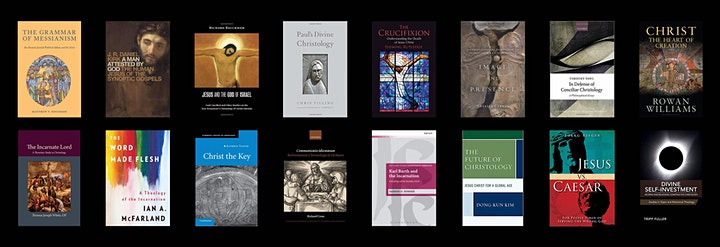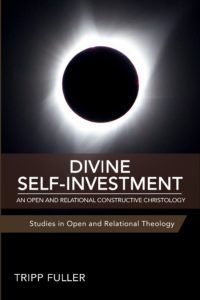Does Jesus Influence Today?
In his ground-breaking book, Divine Self-Investment: An Open and Relational Constructive Christology, Tripp Fuller offers exciting proposals for making sense of Jesus in the 21st Century.
I previously offered an overview of Fuller’s key ideas. That essay and this are part of my response to Fuller’s book at the upcoming Christ Among the Disciplines online conference. For this essay, I ask two related questions:
Does Jesus influence us today? If so, how should we understand his influence?
Jesus Mediates God?
To explore answers, I might turn to explore the verbs in Fuller’s book that speak of Jesus’ causal influence. In Divine Self-Investment, we read that Jesus “reveals God,” “initiates faith,” “functions as a representative of God,” “proclaims the kin-dom,” “symbolizes God,” “becomes the Christ,” “reveals a higher order of subjectivity,” “embodies the fruit of a tradition,” “models salvation,” and “reveals the nature of God.” Most of these verbs are Fuller’s own but some come from his interlocutors.
The verb I choose to highlight is “mediate.” Fuller says “Jesus Christ mediated the presence and salvation of God,” and “Jesus Christ mediates the existential encounter with God.” To explore what it might mean for Jesus to influence today, we might ask what it means to say, “Jesus mediates God.”
Naturalistic Jesus
One way to handle “mediate” and the other verbs is to say they apply only to Jesus’ actions roughly 2,000 years ago. This way might say Jesus acted long ago but it does not influence us today. Let’s call this the “Naturalistic Jesus” view of how Jesus mediates God.
This view doesn’t address many of our metaphysical questions about God, except perhaps how God acted 2,000 years ago. It does not address how Jesus’ mediating might occur today.
I get the impression from Fuller that he wants to affirm something about how Jesus’ mediates God in the present. He talks, for instance, about Jesus “mediating an existential encounter with God.”
Perhaps I’m wrong, but Fuller seems to believe Jesus is causally influential in our time.
Chasm
In my Evangelical youth, the word “mediate” was used to by my religious teachers to portray Jesus as the “go-between.” Jesus mediates a God “up there” who cannot associate with rotten sinners down here. We need Jesus to bridge this gap. Let’s call this second way the “Chasm” view.
Fuller’s open and relational vision dismisses the idea Jesus is the bridge across a chasm separating a distant and holy God from isolated and sinful creation. He believes we and all creation always already experience God directly. Our alleged sin doesn’t keep God at arm’s length. If only I had heard Fuller’s message in Sunday school!
In short, Fuller’s view that Jesus mediates God doesn’t fit the Chasm view of mediation.
Bible Stories Mediate Jesus
I’ll call the third possibility for understanding Jesus as mediator the “Bible Stories” view. It says stories of Jesus in the Bible may (or may not) inspire us today to think about, understand, or encounter God. These biblical texts aren’t themselves causal agents. They are literary resources of information and inspiration.
Scripture mediates Jesus so we can witness Jesus as mediating God. Without the Bible, says this view, Jesus’ mediating revelation would be lost.
Fuller’s Christological work can incorporate the Bible Stories view of Jesus as mediator. But I think he wants to say more. Scripture is important. But I suspect Fuller believes Jesus mediates God, even if the Scriptures had not been written.
The Bible Stories view falls short of a robust view of Jesus mediating God.
Butterfly Effect
A fourth way to understand Jesus’ mediating builds from the open and relational ontology Fuller embraces. It says Jesus’ action thousands of years ago launched a community who remembered and lived out Jesus’ vision. This community continues today, thanks to messages and practices passed along by generations of Jesus followers through formal means (e.g., apostolic succession) or informal ones (e.g., house churches).
Let’s call this the “Butterfly Effect” view of Jesus as mediator in honor of the chaos theory notion that actions far away and in the past can through a causal chain affect the present right here.

Fuller’s ontology can incorporate the Butterfly Effect view. In fact, a relational vision says ideas and practices in the past can be consciously carried to the present. It also says such causal influence can be carried forward through unconscious, pre-linguistic, and nonsensory causation.
An open and relational ontology supports a host of claims theologians often make about the transmission of ideas, rituals, and ways of being launched by Jesus. They claim God plays a key role in this mediation, but it is neither all divine action nor all creaturely causation.
But can Fuller say more? Does it make sense to say Jesus acts today mediating God through direct causal influence on you and me?
Heavenly Jesus
A fifth way builds from Jesus’ resurrection and continued subjective experience beyond the tomb. I’ll call this view the “Heavenly Jesus” perspective. It says life after death is possible for humans and perhaps all creatures. Those who continue living beyond bodily death have causal capacities that can influence the living.
If this view of the afterlife is true, the risen Jesus could influence us now and mediate God. Fuller doesn’t address this Heavenly Jesus possibility, but a Whiteheadian metaphysic allows for it.
In my view, the Heavenly Jesus theory has a problem. This problem emerges when we consider the scope of Jesus’ post-mortem influence. I and most theologians don’t think a life after death experience would involve creatures becoming omnipresent. Wherever we “go” or “are” in the afterlife, we remain localized, not ubiquitous.
If the risen Jesus directly mediates God now, he could only affect a few of us. Jesus might be our brother alongside others in great cloud of witnesses or the ghost-like “stranger on a bus trying to make his way home.” But the risen Jesus is not an omnipresent Spirit influencing all creation, all at once.
The influence of the localized Heavenly Jesus would, to use the Whiteheadian language, be negatively prehended by the majority of us.
Jesus = God?
Upon hearing these five possibilities for how Jesus mediates God, the reader might wonder why I have not addressed the possibility Jesus directly mediates God in the present because Jesus is God. Let’s call this sixth option the “Jesus = God” view. It says an omnipresent God influences all creation in the present, and therefore Jesus — being divine — influences all in the present.
Although it is popular in some circles, there are many reasons to reject the Jesus = God view. It’s not a view Fuller adopts. Jesus did not exhibit the attributes most theologians think essential to God: omnipresence, omniscience, omnipotence, necessary existence, and so on.
Besides, if we say Jesus = God, then saying, “Jesus mediates God” also means, “God mediates God’ and “Jesus mediates Jesus.” What Fuller seems to mean by “Jesus mediates God” slips into circularity.
Confusion abounds!
God Mediates Jesus?
Let me mention a final possibility. This view says God prehends all creaturely activity, including Jesus’ past and (if a Heavenly being) current actions. Upon prehending these actions, God offers Jesus’ causal influence to us now. God presents Jesus to us in each moment in various ways, using various means.
Fuller’s open and relational metaphysics readily accepts this view. It’s part of his open and relational vision. But I don’t list it as a seventh model, because it sounds more like God mediates Jesus than Jesus mediates God.
Fuller seems to have something else in mind when he says “Jesus mediates God” or “Jesus Christ mediates the existential encounter with God.”
Other Ways?
Among the six options for understanding what it means for Jesus to mediate God, I find option four most helpful. But I don’t rule out options three and five.
Perhaps there are other ways of understanding what it means for Jesus to mediate God. I’d love to hear which option or options Fuller finds most helpful and if he can imagine others.
If you have other options to propose, let me know!



Comments
Fuller’s book is next on my reading list. I will use your review to guide my questions as I read.
Interesting list. I would propose in one sense every peoposed view has its place but must be grounded epistemologically in the „naturalistic“ or „historical“ view. But – and this would be my main point – without the HolySpirit there is no way there can be an existential encounter with Jesus today. I would add that even at Jesus time there could not have been an existential encounter with Jesus the Christ, the Son of God, without the HolySpirit. In other words, this question cannot be answered merely Christologically but has to be widened Pneumatologically.
Thanks, Michael. I agree with you. I think divine action — the spirit — is crucial.